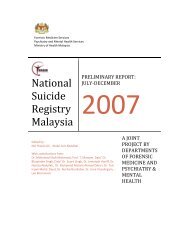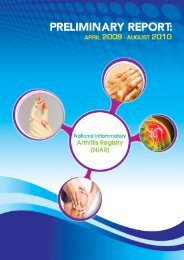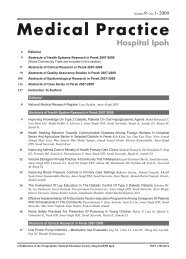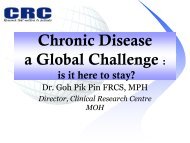Outline of Presentation What is Clinical Research? Children's Health
Outline of Presentation What is Clinical Research? Children's Health
Outline of Presentation What is Clinical Research? Children's Health
Create successful ePaper yourself
Turn your PDF publications into a flip-book with our unique Google optimized e-Paper software.
Why <strong>Research</strong> in Children’s <strong>Health</strong><br />
� Early years <strong>of</strong> children's lives and significant impact on<br />
physical, behavioural & social development later in life.<br />
� Many childhood conditions & problems are preventable or<br />
can be improved if recogn<strong>is</strong>ed and managed early.<br />
� Best results = pr<strong>of</strong>essionals work in close partnership<br />
with parents who are supported & empowered to make the<br />
best choices for their children.<br />
� Translate up-to-date research and evidence (those shown<br />
to be effective and appropriate) into policy formulation at<br />
all levels (children / families, to school and community /<br />
country).<br />
Ref: http://www.rch.org.au/ccch/index.cfm?doc_id=10694<br />
Unique features <strong>of</strong> <strong>Clinical</strong> <strong>Research</strong> in Children’s <strong>Health</strong>*<br />
� Often involve multi-d<strong>is</strong>ciplinary team – various methodological<br />
approaches<br />
� Often aims to study full spectrum <strong>of</strong> child development &<br />
behaviour – reliability & validity<br />
� Often addresses more abstract <strong>is</strong>sues – e.g. community support,<br />
adjustment to illness (validated measures not available)<br />
� Ecological perspective (i.e. socio-cultural influences on child<br />
development and behaviour) – difficulty to measure, report<br />
accurately, and interpret/explain<br />
� Often relies on parent report – influenced by parents’ own<br />
perception <strong>of</strong> state<br />
� Advocacy <strong>is</strong>sues (protecting interest <strong>of</strong> the children)<br />
� Ethical <strong>is</strong>sues (confidentiality, d<strong>is</strong>closure, ability to consent, use<br />
<strong>of</strong> placebo)<br />
*<strong>Research</strong> Foundation, Methods & Issues in Developmental-Behavioural Paediatrics: D<br />
Schonfield, B Dreyer, Developmental-Behvaioural Paediatrics by Wolraich et al, 2008<br />
Main research themes in CCCH, RCH:<br />
� Development, behaviour and mental health<br />
� Hearing<br />
� Language, learning and literacy<br />
� Obesity & <strong>Health</strong>y Weight<br />
� Safety promotion and injury prevention<br />
� Children with additional needs<br />
*New Millennium Morbidities in Paediatrics<br />
<strong>What</strong> works? The need <strong>of</strong> evidence and the<br />
“best-buy” concept)<br />
� Like any other health care intervention, health<br />
promotion activities can do harm as well as good (e.g.<br />
inaccurate/incorrect information <strong>of</strong>fered, poor screening test for a<br />
variety <strong>of</strong> reasons, health information causing anxiety/guilt, etc.)<br />
� Ethical imperative to ensure that child health<br />
promotion activities are subjected to as robust an<br />
evaluation as any other health care intervention.<br />
� <strong>Research</strong> base in health promotion takes time to<br />
develop and absence <strong>of</strong> evidence <strong>of</strong> effect <strong>is</strong> not the<br />
same as evidence <strong>of</strong> absence <strong>of</strong> effect.<br />
Ref: D Hall & D Elliman: <strong>Health</strong> for All Children, 4 th ed. 2003, p 22-25<br />
Common / Important<br />
Children’s <strong>Health</strong><br />
<strong>Research</strong> Topics








